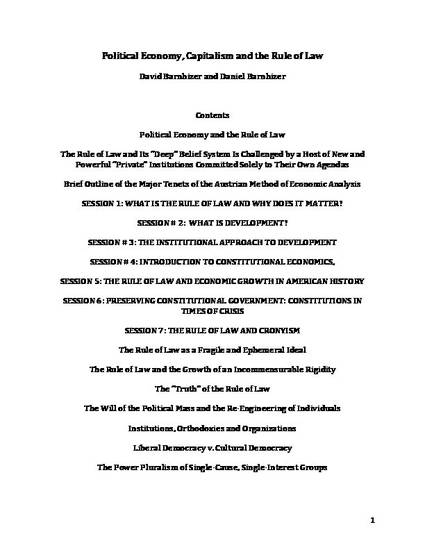
Unpublished Paper
Political Economy, Capitalism and the Rule of Law
unpublished paper
(2016)
Abstract
There is a fundamental symbiotic relationship between a society’s form of economic activity and the nature of the Rule of Law system that supports, facilitates and limits that activity. At the heart of the interactive relationship is a dynamic by which power is created, allocated, denied and adapted over time. The core fact is that of change and transformation of the nature of power and the identities of those who control it. Nothing in such a system remains static and, unlike other systems, it is the natural intent of the system to reward its participants for creative contributions that sustain and advance its dynamism. The Rule of Law in the Western democracies represents the collection of deeper cultural values within which the dynamic activity takes place and operates as a facilitator, governor and definer of the economic activity by which power is distributed and social goods created and shared.
Joseph Schumpeter once explained: “The capitalist process not only destroys its own institutional framework but it also creates the conditions for another. Destruction may not be the right word after all. Perhaps I should have spoken of transformation.” This point is raised because it seems quite obvious that we are at a point of transformation and that, while we can understand that fact without question, we still have no clear idea about the full nature, scale, elements, timing, costs, benefits or consequences of that transformation. It is much like Nikolai Kondratiev observed in accordance with his description of “Kondratiev Waves” that periodically affect the form and structure of an economic system. Although there are challenges to the existence of the periodic “waves” in terms of their specific timing there is no real dispute that capitalist societies undergo fundamental transformations. We are experiencing such a transformation at this point, it has been unfolding for more than a decade and is still not finished. A key aspect of Kondratiev’s “Wave” concept is that the system does not simply change in degree as a linear phenomenon but shifts “in kind” and takes on new characteristics while discarding some of those associated with its previous form.
Given what we are saying about the close connection between economic activity and the Rule of Law within which that activity takes place we assert that it is difficult if not impossible to understand either sub-system in isolation from the other. It is also inevitable that the Rule of Law element, while creating a framework within which economic activity occurs is largely controlled by that economic sphere. We are fully committed to the Western version of the Rule of Law and consider the form that economic activity takes in Western democracies as a vital “cause-and-effect” element of that system. In this brief analysis we will try to make these considerations obvious and provide some context and support for the assertion. At the beginning we want to make plain that this exercise is not empirical or evidential. It is not perfectly rational or demonstrable through use of pure logic or Reason. Nor do we want to conceal or deny that in some ways the insights or claims offered are not partial, presumptive, based on principles that cannot be proven, hypocritical, or representative of ideals rather than “truths”.
Keywords
- Key Words: Austrian School of economics,
- Rule of Law,
- Weber,
- Hayek,
- rules and institutions,
- power,
- Kondratiev Waves,
- crony capitalism,
- role of government,
- relationship between economic forms and the Rule of Law,
- public and private institutions,
- legal rules,
- customary rules and institutional scale,
- SIFI and its systemic dangers,
- Rule of Law as deep belief system,
- the individual and the community,
- freedom and repression,
- New Institutional Economics,
- law as a predictive mechanism,
- Rule of Law as restraint on government,
- innovation,
- entrepreneurship,
- Rule of Law as law above the state,
- emergencies and crises and the danger of new government powers,
- “too big to fail”,
- formal and informal institutions,
- property and the paradox of government,
- arbitrary government,
- liberty versus majoritarian democracy,
- Constitutional Economics,
- Constitutional Political Economy,
- the power of special interests,
- propaganda,
- ideology of Progressivism,
- Regime uncertainty,
- Institutional uncertainty,
- discretionary government,
- rent seeking,
- elites and masses.
Disciplines
Publication Date
2016
Citation Information
David Barnhizer and Daniel D. Barnhizer. "Political Economy, Capitalism and the Rule of Law" unpublished paper (2016) Available at: http://works.bepress.com/david_barnhizer/105/
